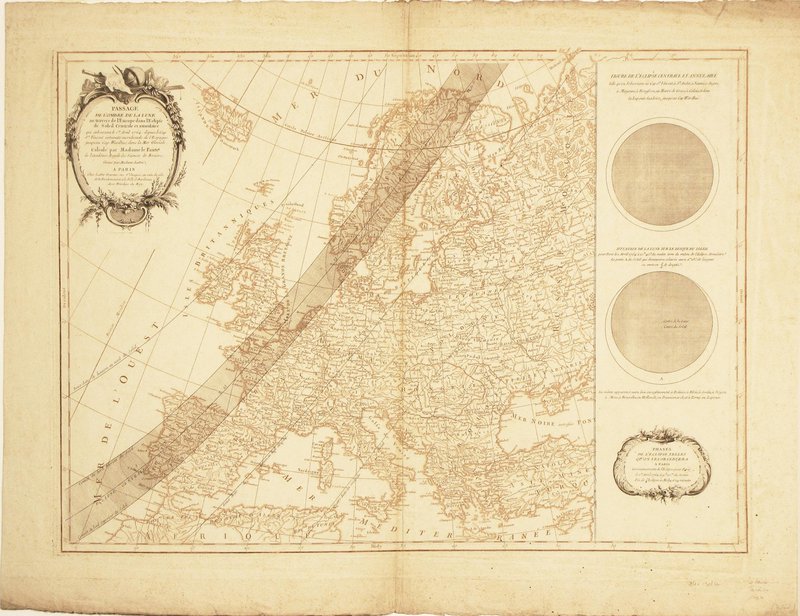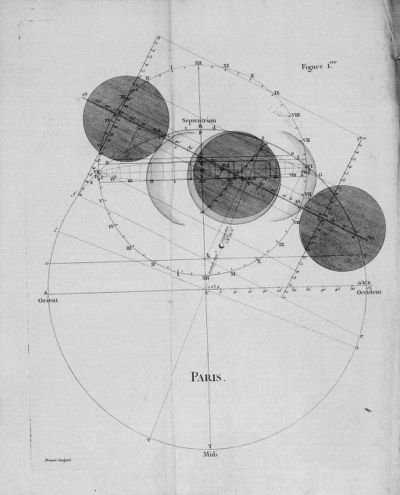
PASSAGE DE L'OMBRE DE LA LUNE au travers de l'Europe dans l'Eclipse de Soleil Centrale et annulaire qui s’observera le 1er. Avril 1764. Calcule par Madame / le Paute (from Nicole-Reine Lepaute, Explication de la carte, qui représente le passage de l’ombre de la lune au travers de l’Europe dans l’éclipse du soleil centrale et annulaire du premier April 1764 présentée au Roi le doye Août 1762). Paris, Bibliothèque nationale de France
A solar eclipse on 1 April 1764 (near total in Paris) was of considerable public interest across Europe, widely reported and studied in France, Germany and England. In England, a report, ‘Observations on the eclipse of the sun, April 1, 1764: In a letter to the Right Honourable James Earl of Morton, Pres. R. S. from the Rev. Nathanael Bliss, M. A. Savilian Professor of Mathematics at Oxford, and Astronomer Royal’, was published in the Philosophical Transactions of the Royal Society for 31 December 1764. [To download a pdf of Bliss’s article, click on the link below].
Bliss, Philosophical Transactions.pdf
Plate from Carlier d’Epuisart’s Calculs et projections de la grande Eclipse de Soleil, le premier Avirl 1764. . . Apprové par l’Academie Royal des Sciences, le 3 September 1763 (Paris, 1764) Paris, Bibliothèque nationale de France
The earliest French publication to predict the path of the eclipse was the Explication de la carte, qui représente le passage de l’ombre de la lune au travers de l’Europe dans l’éclipse du soleil centrale et annulaire du premier April 1764 présentée au Roi le doye Août 1762 of Nicole-Reine Lepaute, who had made her name as a mathematician and astronomer by nearly predicting the return of Halley’s Comet in March 1759. A second calculation was advertised in the March Mercure de France, Carlier d’Epuisart’s Calculs et projections de la grande Eclipse de Soleil, le premier Avril 1764. . . Apprové par l’Academie Royal des Sciences, le 3 September 1763 (Paris, 1764). [To download a pdf of Carlier d’Epuisart's treatise, click on the link below]
Carlier d’Epuisart’s Calculs et projections de la grande Eclipse de Soleil.pdfIn addition to scientific interest in the eclipse, the French authorities were also concerned that popular superstitions concerning eclipses would provoke anxiety among the populace. To that end, a notice directed at the French clergy was published in the Gazette de France, 19 March 1764, 92:
- Comme on craint que l’Office du matin, qui doit se célébrer les différentes Paroisses le Dimanche 1er Avril prochain, ne soit troublé par la frayeur & la curiosité que peut exciter parmi le people l’Eclipse annulaire du Soleil, on a cru qu’il ne seroit pas inutile de rendre public l’avis suivant.
Les Curés, tant des Villes que de la Campagne, sont invites à commencer plutôt qu’à l’ordinaire l’Office du quatrième Dimanche du Carème à cause de l’Eclipse totale du Soleil qui sur les dix heures du matin ramenera a les ténèbres de la nuit. Ils sont priés en même temps d’avertir le people que les Eclipses n’ont sur nous aucune influence ni morale ni physique; qu’elles ne présagent & ne produisent ni stérilité, ni contagion, ni guerre, ni accident funeste, & que ce sont des suites nécessaires du movement des Corps célestes aussi naturelles que le lever & coucher du Soleil ou de la Lune.
- As it is feared that the matins that will be celebrated by the different parishes next Sunday, the 1st of April, will be disturbed by the fear and curiosity that may be excited among the people on account of the eclipse of the sun, it is believed that it would not be useless to make public the following opinion.
Priests, both in the cities and in the countryside, are invited to start rather earlier than usual the office of the fourth Sunday of Lent because of the total eclipse of the sun which will bring darkness at ten o'clock in the morning until night. They are asked at the same time to warn the people that eclipses have no moral or physical influence on us; that they do not presage or produce sterility, contagion, war, or fatal accident, and that they are the necessary result of the movement of celestial bodies as natural as the rising and setting of the sun or the moon.
- Mozart Relevance
-
Leopold Mozart witnessed the eclipse on 1 April, writing to Johann Lorenz Hagenauer the same day, noting the French authorities’ worries, alluding to scientific interest in it even among the populace, and providing his own anti-French gloss, typical of his suspicion of both the French generally and, more particularly, the French priesthood:
Fools everywhere are lacking in sense. But in Paris it seems that all superstition has been proscribed. Indeed, they don’t even scruple to regard many an ecclesiastical law as a matter for superstition, and if they see an eclipse, then this may result in a general commotion in Paris. For the past 2 weeks the glaziers in Paris have been collecting all the old fragments of glass that they can find and painting them blue or, rather, black, and then piecing them together in the shape of an octavo sheet of paper or in whatever shape the shards of glass produced, framing the edges with gold paper and offering them for sale at their shops or hawking them around in the street. And so yesterday you could see everyone in the street watching the sun through these glasses or else trying them out. This is no superstition. – – But the fact that people hurried to church this morning in order to protect themselves from the poisoning of the air that would stem from this eclipse; that everyone said and believed that a final Mass would be held at 9 o’clock and that all churches would then be locked; that this eclipse would be so severe that a plague could subsequently be feared; that it would be so dark for 3 hours that people would have to use candles and a hundred other such things: these are just vulgar superstitions. – – And do you know that the clergy themselves |: perhaps innocently :| are to blame for this? They announced from every pulpit that because of the eclipse High Mass and the prayers that normally followed and that usually take place from 10 o’clock till half past 11 would be at 8 o’clock on 1 April, but instead of giving the true reason, they simply added: to avoid all unrest. The common people took this to refer to themselves, whereas it should be understood to apply to the clergy themselves, who did not have themselves locked away in monasteries as in Germany, but in some cases even went to the famous observatory that Louis XIV had built in 1667, and there they observed the eclipse, while others observed it from home or from somewhere else, with the result that there would indeed be complete chaos. It was in order to make things easier for all these gentlemen that prayers and High Mass were held earlier than usual. – – – parturiunt montes, nascetur ridiculus mus. The glaziers didn’t make their pieces of glass for nothing; but the buyers spent their money for nothing. It rained heavily, but in spite of this it was no darker than it is, say, when it starts to get dark in the evening.
- Date 1
- 1 April 1764
- Location
- Paris
- Date (Mozart)
- 1 April 1764
- Location (Mozart)
- Paris